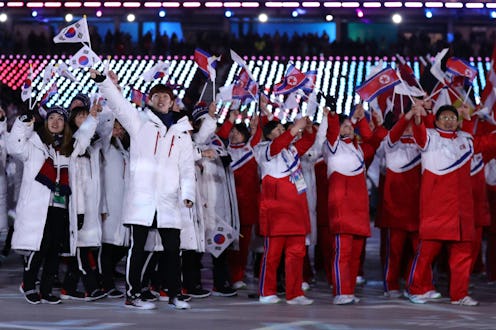News
The Closing Ceremony Marked The End Of Unity Between North & South Korea — PHOTOS

The Olympics, often a venue for soft diplomacy, came to a close on Sunday after two weeks of intense competition. And as the closing ceremony concluded, so did the Olympic unification of North and South Korea. Photos of the final procession showed athletes from both Koreas marching together, but donning separate uniforms. Though some athletes chose to wave the Korean unification flag — a show of unity — many international relations experts are skeptical that the harmony will continue now that the 2018 Winter Games have ended.
The divisions on the Korean peninsula are defined not just by how well the North and South get along from year to year, but also by how each interacts with the United States. While relations between North and South Korea are tenuous at best, South Korea and the United states have historically been tremendous allies. (President Obama once described South Korea as one of the United States' "closest allies and greatest friends.")
However, North Korea and the United States have recently pitched their generally cold interactions into an increasingly threatening standoff. Led by President Trump's Twitter account and met by statements from North Korean leaders, each has threatened the other several times over in the last year.
What is left is a North Korean government that is, at best, difficult to read, and an American government caught between best serving South Korea and defending itself against potential military action from North Korea. While the 2018 PyeongChang Winter Games offered a glimpse at what relative peace among all three nations might look like, they were also marked by persistently cold symbolic actions, particularly between the United States and North Korea.
During the opening ceremony, Vice President Mike Pence led Team U.S.A. to the Games, and almost immediately as he did so, he sparked controversy about U.S.-North Korean relations. Seated just a row away from Kim Yo Jong, North Korean leader Kim Jong Un's younger sister, Pence opted not to stand when the unified North and South Korean delegation marched into the arena during the Parade of Nations. Pence also reportedly skipped a pre-opening ceremony dinner hosted by South Korean President Moon Jae-in, where he was scheduled to share a table with Kim Yong-Nam, North Korea's ceremonial head of state. Hence, from the very first official day of the 2018 Winter Games, tensions were already mounting between the United States and North Korea.
These tensions continued to build when on Friday, Feb. 23 President Trump announced what he described as the "heaviest sanctions ever" implemented against North Korea. "We must continue to stand together to prevent the brutal dictatorship from threatening the world with nuclear devastation," Trump said in a press conference with the Australian prime minister.
When it came time for the closing ceremony, President Trump's daughter and adviser, Ivanka Trump, flew to PyeongChang. Unlike Pence, Ivanka did stand when the Korean delegations walked in, but an anonymous official unauthorized to speak publicly told The New York Times that she only reportedly did so because the two countries were visibly distinct from another.
How the relationship between North and South Korea will evolve once the luster of the Olympic Games has worn off is unclear. While peace between the two countries would be ideal, a lot is at stake because, though they are neighbors, their interactions are never truly bilateral. At least one other country, or even the entire United Nations, has a hat in the ring. What happens between them ripples around the world.
Above all else, nuclear capabilities and the implications of those capabilities — namely, war — define how the United States and North Korea publicly interact. As sanctions against the reclusive state increase, even the tiniest change — or tweet, for that matter — can have major ramifications.